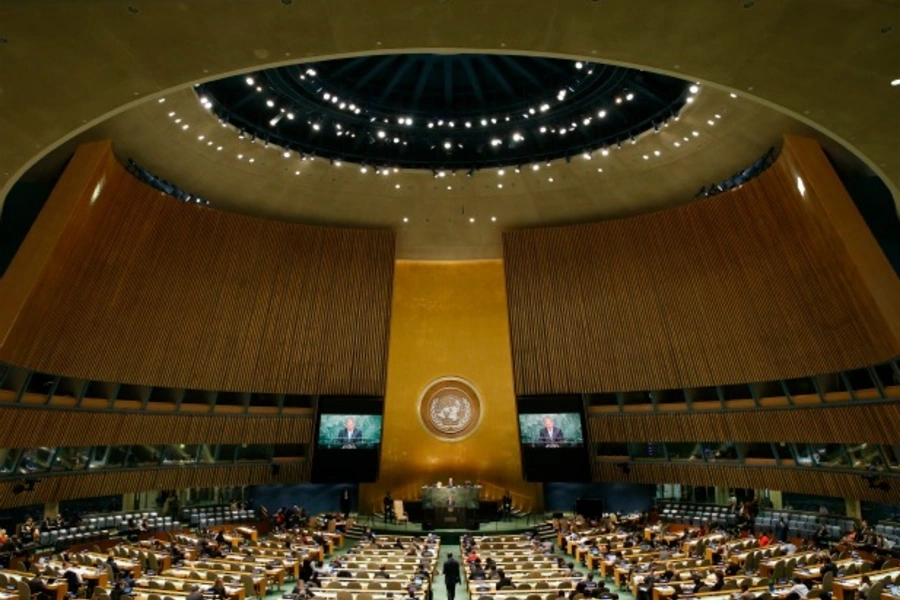WSIS+10: In Internet Governance, Actions Speak Louder Than Words

More on:
Byron Holland is the CEO of the Canadian Internet Registration Authority, which manages the .ca domain.
A decade ago, a landmark summit was held in Geneva and Tunis to discuss how the digital divide between the developing and developed world could be bridged. This week representatives from more than 190 nations are meeting in New York to assess the progress made since the World Summit on the Information Society (WSIS), and those discussions could influence Internet governance for the foreseeable future.
A lot has changed in the past ten years. The number of Internet users has tripled to more than three billion; the Internet is now estimated to contribute $4 trillion to the world’s top twenty economies each year. It has become the catalyst for revolutions and radically changed the ways in which many of us communicate with each other. However, the digital divide that the WSIS was intended to address persists. Sixty percent of the world’s population still do not have access to the Internet and are therefore excluded from the tremendous economic and social benefits that come with it.
It incumbent upon all of us, governments, the private sector and civil society, to work together to shrink this divide. However, how to do so, and who gets to make those decisions, continue to be points of contention.
The historically unparalleled growth of the Internet is, as I and many others would argue, in large part due to the bottom-up, organic approach inherent to the governance model employed to manage its global development. Underpinned by the principles of inclusiveness, collaboration, openness, and transparency, the multistakeholder model has been the foundation of the Internet’s success.
The multistakeholder model ensures that all organizations that have an interest in the Internet’s success have an equal voice at the table when decisions about its development are made, a necessity for an entity as complex as the global Internet. It has facilitated the development of the greatest driver of positive economic and social change humankind has seen in centuries, and it has the power to accelerate the flow of knowledge, education, communication, and wealth globally.
While the Tunis Agenda, the output of the WSIS in 2005, called for a lightweight, multistakeholder approach to Internet governance, there have been numerous attempts by certain governments to exert their authority over critical Internet resources over the past ten years. A multilateral approach, one that would put governments in the role of decision-maker, has been preferred by a number of states (primarily from the BRICS group). The negotiations leading up to this week’s meeting has seen the debate over ‘who should run the Internet’ brought to the forefront once again.
I was therefore pleased to see that the latest draft of the outcome document—the text that will form the basis of the discussions this week at what is known as WSIS+10—recognizes the value of the multistakeholder model. It attaches “great importance to multistakeholder implementation at the international level” and goes as far to say that “building an inclusive development-oriented Information Society will require unremitting multistakeholder effort.”
Those are strong words of support for a model of governance that is sometimes represented as the antithesis of the multilateral approach symbolized by the United Nations. While there are many sections of the text that remain problematic, I see this as progress.
Of course, negotiated text is one thing. Actions can be, and often are, something completely different. While the outcome document borders on the self-congratulatory for the UN’s commitment to the multistakeholder model in the WSIS process, I’m afraid the reality tells a very different story.
Yes, there have been open consultations with non-state actors leading up to the high-level meeting (often held with less than a week’s notice) and yes, the outcome document has been posted for public comment (the last time for less than 72 hours). However, this is not meaningful multistakeholder participation.
Putting aside the very real challenges of travelling to New York for an open consultation with minimal notice, or providing meaningful input to the draft outcome documents in very short order, the process to get to this point has been stacked in the favor of governments. The real work of drafting the outcome document has taken place behind closed doors at the UN, with the technical community, civil society and the private sector largely shut out of the process. I would argue that it does not live up to the spirit and intent set out by the Tunis Agenda a decade ago.
In this context, the multistakeholder model may be best defined by what it is not, as opposed to what it is. ‘Consultation’ with stakeholders is not multistakeholder; it is a multilateral approach with input from affected parties. A true multistakeholder approach sees all affected parties come to the decision-making table with equal opportunity for input.
Moving forward, the multistakeholder model will become increasingly important in addressing the digital divide. Recognizing the importance of the Internet to development in the global south, the UN’s recently adopted Sustainable Development Goals (SDGs) call for universal and affordable access to the Internet by 2020. The degree to which the SDGs are linked to the global adoption of information and communications technologies cannot be overestimated. Achieving these lofty goals will require an approach that includes full multistakeholder participation.
I applaud the United Nations on its recognition of the value of the multistakeholder model for Internet governance in the WSIS+10 outcome document. However, given the process leading up to next week’s meeting, I am skeptical that it is any more than high-minded rhetoric and empty gestures.
More on:
 Online Store
Online Store